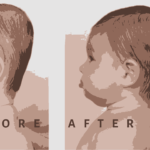7 Signs That You Are Overfeeding Your Baby

Has the possibility of overfeeding your baby ever crossed your mind? It is possible to overfeed your baby, and there are tell-tales when it occurs. The big question is, how can you tell that the baby is full, and when should you stop?
Unlike adults who stop eating when full, babies have little control over how much gets into their stomachs. In this article, we will look at:
- Causes of overfeeding a baby
- Signs of an overfed baby
- How to Know When a Baby is Full
- Effects of overfeeding a baby.
Causes and Scenarios of Overfeeding in Babies
Overfeeding a baby is a common mistake that many parents and caregivers make. These are causes and scenarios that lead to overfeeding in babies. Let’s look at them separately.
Causes of Overfeeding in Babies
1. Bottle Feeding

Whether you pump breast milk into a bottle or put formula in a feeding bottle, you might overfeed the baby. Feeding bottles allow the milk or formula to flow freely, making the baby keep feeding even when full.
2. Coaxing the Baby
Although babies give cues of being full, they are likely to continue feeding if you coax them. Parents and caregivers might continue forcing nipples or feeding bottles in the babies’ mouths, even when the babies are full.
3. Using a Large Feeding Bottle
Using a large feeding bottle encourages overfeeding on the side of the baby. More often than not, parents and caregivers would push the babies to finish whatever they had served. The baby would overfeed if the milk or formula were in a large bottle.
Scenarios That Could Lead to Overfeeding Your Baby
1) Misreading cues
Parents and caregivers misread crying in babies as a sign of hunger. Babies might cry due to diaper rash, colic, or even for being tired, and not necessarily due to hunger.
2) Difficulty with the bottle
Feeding on a bottle makes it hard for the baby to control the milk or formula’s flow, making them susceptible to overfeeding.
3) Weight expectations
Parents and caregivers expect their babies to have a particular weight, which is normal. Failure to have a certain weight might force them to overfeed the baby.
4) Expected Eating Patterns
Some parents expect babies to feed on certain foods and certain servings. Having a fixed mindset on the amount the baby should eat makes them overfeed.
7 Common Signs of an Overfed Baby
These are the seven most common overfeeding baby signs to note:
a) Vomiting
One of the most obvious signs that your baby is full and does not need more feeding is when it starts to vomit.
How can you tell the difference between vomiting and spitting in babies? Spitting occurs when the stomach contents, mostly what they had fed on, flow easily through the side of the mouth. On the other hand, vomiting is the forceful expulsion of the same content through the mouth or nose.
You should stop if the baby vomits after feeding them for some time. They are full. If the vomiting persists, it’s advisable to see a pediatrician.
b) Fussiness and Irritability
Another sign that you are probably overfeeding the baby is when they suddenly become fussy and easily irritated. If you have been feeding the baby for quite some time, you must stop. When a baby’s stomach is full, any additional content creates discomfort, making them irritable or fussy.
c) Foul-Smelling Stool
When you overfeed a baby, their digestion process is altered. The poor digestion, more often than not, leaves their poop smelly. Of course, human stool must have a not-so-good smell, but this particular stool stinks. The stool also appears to have some gas in it.
d) Choking
Most people don’t say it, but when you start to overfeed a baby, they will choke more frequently. Since the stomach cannot accommodate more content, the baby will likely choke to stop more ingestion.
e) Bloating and Gas
A bloating and gassy stomach is another sign that you have overfed the baby. Bottle feeding is the leading cause of bloating since the baby swallows some gas when feeding.
f) Continuous Spitting
A full baby will constantly spit when you try feeding them. The first warning sign that the baby is full is when they turn their head away from the breast or bottle. If you force them to continue feeding, they will spit all the contents out. You wouldn’t want to deal with clothes soaked with spit, would you?
g) Sleeping Issues
An overfed baby will struggle to sleep, contrary to the misinformation that overfeeding them makes them sleep heavily. You will know that the baby is overfed if they keep touching their tummy and face from time to time while asleep. Besides, such a baby will wake up after a few minutes of sleep.
What are the Effects of Overfeeding a Baby
Did you know that overfeeding a baby has serious effects? Overfeeding a baby poses a serious threat to their lives and well-being. These are the most common side effects that you expose your baby to for overfeeding:
- Weight and Obesity
Overfeeding a baby causes them to gain abnormal weight, which puts them at risk of developing sleep apnea. Excess weight gain in babies causes their joints and bones to develop complications, which may hinder their mobility.
Other complications associated with abnormal weight gain due to overfeeding in babies include obesity, heart disease, and high blood pressure.
- Vomiting
Overfeeding a baby makes them susceptible to constant and frequent vomiting. Although vomiting is a normal issue when a baby is overfed, when it goes on for a long time, it weakens the baby’s immunity.
- Gastroesophageal reflux disease (GERD)
Overfeeding the baby for a long time makes them sick due to the accumulation of acid in the stomach. The acidity is a symptom of GERD, which may lead to weight loss in the long run.
How Do You Know if the Baby is Full?
We have now discussed the seven most common symptoms, causes and scenarios, and effects of overfeeding in babies. How do you know if the baby is full? Pay attention to these symptoms to know if the baby is full:
- Pushing the bottle away
If your baby has strong hands, they will likely push the bottle or breast when full. If they push the bottle or breast away, you don’t have to keep coaxing the baby to continue feeding.
- Falling Asleep
A baby whose stomach is full sleeps without much fuss. Whether the baby is bottle feeding or breastfeeding, as long as they are full, they will never strain to sleep.
- Keeping Mouth Shut
Seeing the baby shut its mouth when you bring food, a bottle, or a breast close to its mouth could mean it is full. You should stop feeding them at this point, lest you overfeed them.
- Turning Head Away
While feeding the baby, you might see them suddenly turn their head away. If you see them do this, it is time to clean their mouth and let them breathe; they are full.
- Crying
Like I said earlier, your baby will never say they are full but will give cues. Trying to feed a full baby will only make them let out a cry.
- Slower Sucking
You must have observed that a hungry baby latches on the bottle or breast as if its life depended on the two, which is true. Therefore, if you see the baby slow down on sucking, it means that it is time to stop.
- Easy Distraction
A hungry baby seldom gets distracted, no matter how you try. Therefore, they are full if you see them lose concentration and turn to play with you.
Bottom Line
Parenting is a lifetime commitment, and you should pay attention to how they feed. While feeding the baby ensures they grow healthily, you should avoid overfeeding them. Use the above tips to know when to feed them and when to stop. May your baby grow into the most amazing being you have ever imagined.



